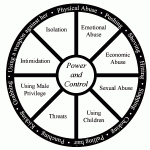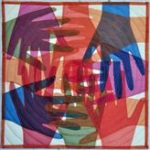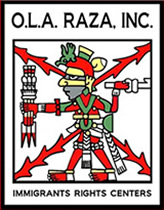OLA Raza, Inc began the Violence Against Women Act (VAWA) project in 1994 after the new law took effect. Our project staff has received training provided by Catholic Legal Immigration Network, Inc (CLINIC). Our organization was also one of the first to receive additional training through the Immigrant Legal Resource Center (ILRC), in the The Victims of Trafficking and Violence Act (VTVPA) program, which was launched that same year.




VIOLENCE AGAINST WOMEN ACT (VAWA)
As a battered spouse, child or parent, you may file an immigrant visa petition under the Immigration and Nationality Act (INA), as amended by the Violence Against Women Act (VAWA).
The VAWA provisions in the INA allow certain spouses, children, and parents of U.S. citizens and certain spouses and children of permanent residents (Green Card holders) to file a petition for themselves, without the abuser’s knowledge. This allows victims to seek both safety and independence from their abuser, who is not notified about the filing.
The VAWA provisions, which apply equally to women and men, are permanent and do not require congressional reauthorization.
U-NONIMMIGRANT STATUS (U-VISA)
The U nonimmigrant status (U visa) is set aside for victims of certain crimes who have suffered mental or physical abuse and are helpful to law enforcement or government officials in the investigation or prosecution of criminal activity. Congress created the U nonimmigrant visa with the passage of the Victims of Trafficking and Violence Protection Act (including the Battered Immigrant Women’s Protection Act) in October 2000. The legislation was intended to strengthen the ability of law enforcement agencies to investigate and prosecute cases of domestic violence, sexual assault, trafficking of aliens and other crimes, while also protecting victims of crimes who have suffered substantial mental or physical abuse due to the crime and are willing to help law enforcement authorities in the investigation or prosecution of the criminal activity. The legislation also helps law enforcement agencies to better serve victims of crimes.
LEY DE VIOLENCIA CONTRA LA MUJER (VAWA)
Como cónyuge, hijo o padre abusado, usted puede presentar una petición de visa de inmigrante al amparo de la Ley de Violencia contra la Mujer (VAWA), por sus siglas en inglés). VAWA les permite a ciertos cónyuges, hijos y padres de ciudadanos estadounidenses y ciertos cónyuges e hijos de residentes permanentes (que tienen una Tarjeta Verde) que presenten su propia petición sin el conocimiento del abusador. Esto les permitirá a víctimas sentirse seguras e independizarse del abusador. Las disposiciones de VAWA aplican igualmente a mujeres y hombres. Su abusador no será notificado de que usted ha solicitado beneficios de inmigración bajo VAWA.
NO INMIGRANTE U (VISA -U)
El estatus No Inmigrante U (Visa U) está reservado para las víctimas de ciertos crímenes, que han sufrido abuso físico o mental y brindan ayuda a las agencias de orden público y oficiales gubernamentales en la investigación o prosecución de actividades criminales. El Congreso creó la visa de No Inmigrante U mediante la aprobación de la Ley de Protección a Víctimas de la Trata de Personas y Violencia (incluyendo la Ley de Protección de Mujeres Inmigrantes Abusadas) en octubre de 2000. Esta legislación está dirigida a fortalecer la capacidad de las agencias del orden público para investigar y procesar judicialmente los casos de violencia doméstica, abuso sexual, tráfico de extranjeros y otros crímenes, a su vez que protege las víctimas de los crímenes que han sufrido abuso mental o físico sustancial producto de dichos crímenes y están dispuestas a ayudar a las autoridades del orden público en la investigación y prosecución de la actividad criminal. La legislación también ayuda a las agencias del orden público a dar mejor servicio a las víctimas de crímenes.



